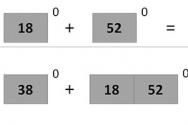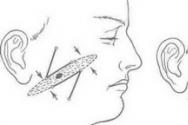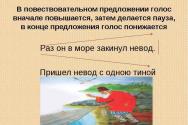The image and characteristics of Masha Mironova in the novel “The Captain's Daughter” by Pushkin: description of appearance and character (Marya Ivanovna). The image of Masha Mironova The image of Masha Mironova, the heroine of Pushkin's story
The very sound of the phrase “ captain's daughter“The image of Masha Mironova is completely different, not the same as described on the pages of the story. It seems that this should be a girl with a mischievous, daring character, bold and flirtatious.
However, the main character of the book is a completely different girl. She is completely devoid of coquetry, she is not characterized by the enthusiasm of youth and the desire of young girls to please everyone without exception. Mary presents a different image. Masha Mironova - every schoolchild's essay quotes this passage - “chubby, ruddy, with light brown hair, smoothly combed behind the ears,” a modest eighteen-year-old girl. It is unlikely that any of the young readers will consider her an attractive person worthy of imitation.
Life and education
The image of Masha Mironova is inextricably linked with the characteristics of her parents - Ivan Kuzmich and Vasilisa Egorovna. Their life passed in Belogorsk fortress, near Orenburg. They lived in a small village with cramped streets and low huts, where the commandant occupied a simple wooden house.
Maria Mironova's parents were sincere and warm-hearted people. The captain was known as a poorly educated man, but he was distinguished by his honesty and kindness to people. Vasilisa Egorovna is a hospitable woman, accustomed to the military way of life. Over the years, she has learned to deftly manage the fortress.

In short, the girl lived a secluded life, communicating mainly with her parents.
Her mother said that Masha is a girl of marriageable age, but she has absolutely no dowry, so it’s good if there is someone who will marry her. It is possible that Vasilisa Egorovna shared her thoughts with her daughter, which could hardly have added to her confidence.
The true character of the captain's daughter
The image of Masha Mironova, at first glance, will probably seem quite boring to many. Pyotr Grinev also didn’t like her at first. Despite the fact that Masha lived alone, one might say secluded, surrounded by her parents and soldiers, the girl grew up very sensitive. Maria, despite her apparent timidity, was a brave, strong person, capable of sincere, deep feelings. Masha Mironova refused Shvabrin’s offer to become his wife, although he, by society’s standards, was an eligible bachelor. Maria had no feelings for him, and the captain’s daughter did not agree. Having fallen in love with Pyotr Grinev, Masha openly talks about her feelings in response to his explanation. However, the girl does not agree to a marriage that the groom’s parents did not bless, so she moves away from Grinev. This suggests that Masha Mironova is an example of high morality. Only later, when Peter's parents fell in love with her, Maria became his wife.

Trials in the life of Maria Mironova
This girl's life cannot be called easy. However, the image of Masha Mironova is revealed more fully under the influence of difficulties.
For example, after the execution of her parents, when Maria was sheltered by the priest, and Shvabrin put her under lock and key and tried to force her to marry him, she managed to write to Pyotr Grinev about her situation. Deliverance came to the girl in a completely unexpected guise. Her savior was Pugachev, the killer of her father and mother, who released her and Grinev. After her release, Peter sent the girl to live with his parents, who sincerely loved Mary. Masha Mironova is the image of a real Russian, but at the same time vulnerable and sensitive. Despite the fact that she faints from a cannon shot, in matters concerning her honor, the girl shows unprecedented strength of character.

The best spiritual qualities of the heroine
The image of Masha Mironova is revealed even more fully after the arrest of Pyotr Grinev, when she showed the true nobility of her nature. Maria considers herself to be the culprit of the misfortune that happened in the life of her lover and constantly thinks about how to rescue her groom. Behind the girl’s apparent timidity lies a heroic nature, capable of anything for the sake of a loved one. Masha goes to St. Petersburg, where in the garden of Tsarskoye Selo she meets a noble lady and decides to tell her about her misfortunes. Her interlocutor, who turned out to be the empress herself, promises to help. The determination and firmness shown by the girl saves Pyotr Grinev from imprisonment.
The image of Masha Mironova in the story undergoes strong dynamics. The misfortune that happened to Grinev allows her to reveal herself as a strong, mature, one might say, heroic personality.

Maria Mironova and Mashenka Troekurova
A. S. Pushkin began writing the story “The Captain's Daughter” in 1833. The idea for this book most likely arose when the writer was working on the story “Dubrovsky”. This work by Pushkin also contains female image. Masha Mironova, about whom schoolchildren usually write essays, is a completely different person than her namesake.

Maria Troekurova also lives alone, albeit in pampered conditions, on her parents' estate. The girl loves novels and, of course, is waiting for the “Prince Charming”. Unlike Masha Mironova, she was unable to defend her love; she did not have the determination to do so.
It seems that with the happy ending with which The Captain's Daughter ends, the author is trying to smooth out the bloodshed that occurred in Dubrovsky.
Image of Masha Mironova and Tatyana Larina
The image of our heroine is to a certain extent consonant with another female character created by A. S. Pushkin in the novel “Eugene Onegin” - Tatyana Larina. "The Captain's Daughter" was written about five years later than "Eugene Onegin". The image of Masha Mironova is revealed more fully and deeply than the characterization of Tatyana. Perhaps this is partly due to the fact that the author himself has become a little more mature. Masha is also, but even more than Tatiana, related to the people's environment.

The main theme and idea of the work
The main problem that Pushkin identifies in his novel is the issue of honor and duty. This can be guessed already from the epigraph, presented in the form folk proverb: “Take care of your honor from a young age.” The main characters of the story demonstrate these qualities in their own way. Pyotr Grinev, despite difficult circumstances, is faithful to this oath. Shvabrin, without hesitation and without delving into the problems of the country and the people, goes over to the side of Emelyan Pugachev. Grinev's servant, Savelich, is devoted to Peter, fulfills the old master's orders, watches over his son, cares for him. Ivan Kuzmich, the commandant dies while fulfilling his duty.
Image main character The story is also integrally connected with the concepts of duty, courage and loyalty. Maria Mironova, like the old captain, is more likely to die than to do something contrary to her conscience.
Another leading topic " The captain's daughter“- this is the theme of family, home, personal relationships. In the story, the author presents two families - the Grinevs and the Mironovs, who passed on the best human virtues to their children, Peter and Maria.
It is in the family environment that moral qualities, such as spirituality, philanthropy, mercy. This theme in the story is as important as the theme of debt.
The image of Masha Mironova is briefly described in just a couple of words, and in the mind, most often, the image of a modest, ruddy, round-faced girl emerges. The depth of her character makes you realize how much is hidden under her simple appearance.
Maria Mironova is the main character of A. S. Pushkin’s story “The Captain’s Daughter” and is its main mystery. Unremarkable, simple, modest, without any talents, alas - ugly - the village girl suddenly becomes the title character of Pushkin’s last major work, in which he reveals himself as a deep thinker, philosopher, historian. What is the reason for such an amazing literary role?
In the story, events related to Masha take up little time: we see her when meeting with Grinev, at the bedside of the wounded Grinev, on the ramparts of the fortress, at the moment when the protagonist takes the girl from Belogorskaya, on a date with the empress. In all episodes except the last one, her role is companion. She is the heroine of a minor love affair, the meaning of which in the 19th century was defined as “luring the reader” to tell him about the main thing. Only at the moment of meeting with Catherine II, Masha’s request becomes fateful for Grinev.
Why does Pushkin call the novel (this is the genre of the work, according to some critics) “The Captain's Daughter”, read - “Masha Mironova”? What author's idea does this almost fabulous, ideal and therefore completely inconspicuous heroine express?
Characteristics of the heroine

(Masha "Illustration by artist Dmitrieva G.S.)
Masha is truly a fairy-tale heroine. She is endowed with all the textbook virtues - modest, bashful, always does “the right thing,” honors her parents and the husband (man) she loves. Nothing betrays a deep intelligence in her, because the heroine speaks and acts according to written laws, instilled in every peasant girl from birth.
Probably, to deepen the impression of insignificance, Pushkin also makes Masha ugly. Her portrait on her first date with Grinev is eloquent: “... about eighteen years old, chubby, ruddy, with light brown hair, smoothly combed behind her ears, which were on fire.” These are the words of Grinev himself, but if a man sees a beauty, what he will remember are not at all flaming ears and a round face.

(Iya Arepina as Masha from the film "The Captain's Daughter" 1958, USSR)
Since childhood, Masha’s social circle has been narrow and closed: parents, village girls, old soldiers (“disabled”). Suddenly, Shvabrin, a young officer who was expelled from St. Petersburg to the “darkness” for a duel, appears in the fortress. As it turns out, before Grinev’s arrival he was courting Masha and even wooing her, but to no avail.
The girl did not rush to him out of melancholy and desolation, and in this act there is a manifestation of Masha’s intelligence, even wisdom. Shvabrin turned out to be “rotten” in his essence: vengeful and petty (he denigrated the girl in front of Grinev, calling him “a complete fool”), cowardly and unfaithful (he broke his oath, betrayed his comrades, going over to Pugachev’s side), cruel - he forced Masha to cohabitate, locking him in closet.

(from the lines of the novel: " Masha sobbed, clinging to my chest")
Masha’s wisdom lies in the fact that she chooses Grinev as her heart - a worthy, noble man. In love, the heroine does not flirt, does not play: “She, without any affectation, confessed to me her heartfelt inclination...”. In this act there is deep respect for the man, a guarantee of future purity of the relationship, when the wife will not deceive or hide anything.
But Grinev’s father resolutely forbids even thinking about marriage. And if Peter is ready to marry Masha without his father’s blessing, then she categorically refuses: “No, Peter Andreich,” Masha answered, “I will not marry you without the blessing of your parents. Without their blessing you will not be happy. Let us submit to the will of God..."
This is not fear, not stupidity. This is extreme respect for traditions, parents, the piety on which the world rests, the family, in which the only thing true happiness is possible. And this act also speaks of Masha’s maximalism: all or nothing. This is the property of natures that are not simple, not limited, but passionate, harboring a lot of strength and desires in the soul.
The characterization of Masha Mironova from “The Captain’s Daughter” is important for understanding the specifics of the work: it was born in the work of the great Russian writer under the influence of the popularity of the translated novels of Walter Scott.
The image of Maria Mironova in the story “The Captain's Daughter”
 He aroused a peculiar attitude towards himself from various critics - the character was not perceived as deep or even remarkable.
He aroused a peculiar attitude towards himself from various critics - the character was not perceived as deep or even remarkable.
Pushkin's close friend P. Vyazemsky saw in the image a certain variation of Tatyana Larina. The frantic V. Belinsky called him insignificant and colorless.
The lack of interest and character was also noted by composer P. Tchaikovsky. Template and empty - assessment of the poet M. Tsvetaeva.
But there were also those who did not attribute the image of the main character to the weak points of the story. Perhaps the most authoritative voice here is the opinion of N. Gogol, who appreciated Pushkin’s short story for its artlessness, truly Russian characters and the simple greatness of unremarkable people.
Characteristics and description of Masha Mironova
Some researchers see the heroine of the novel “Edinburgh Dungeon” by Walter Scott as the prototype of Masha. However, the similarity here is only plot.
To define a character briefly: it is a paradoxical (like history itself and life in general) combination of ordinaryness and simplicity with greatness and exclusivity. Maria Ivanovna is the eighteen-year-old daughter of the captain of the Belogorsk fortress.
The modesty of her family position is combined in her with intelligence and kindness, which the main character of the story appreciated and loved.
They had to overcome a lot to be together: the intrigues of a rival for Masha’s love, the refusal of the groom’s father to bless the marriage, the Pugachev uprising and a military tribunal.
An ordinary girl became the cause of fatal trials for the main character and reaches the empress herself in the hope of saving him.
 The moral beauty of the heroine
The moral beauty of the heroine
The author constantly emphasizes the noble naturalness of the heroine, the absence of coquetry, affectation, and any pretense in feelings and speech. In dealing with people, she is distinguished by sensitivity, tenderness and kindness - the wise Savelich calls her an angel, saying that such a bride does not need a dowry.
Her inherent sweet femininity encourages careful handling of weapons and, in general, everything related to war: a girl who grew up in a military fortress is terribly afraid of the sound of gunfire.
Avoids conflicts and quarrels: he does not say anything bad about Shvabrin, he is immensely upset about Grinev’s duel and his father’s disfavor. She is spiritually wise and sees people with her heart.
Loving Mary wants happiness above all for the person she loves - even if this means marriage to another woman. And all this without romantic pathos and contempt for everyday life: he understands that for happiness a person needs not only love, but also peace and quiet in the family, some kind of prosperity and certainty.
Appearance of Masha Mironova in the story “The Captain's Daughter”
 Pushkin consciously sketched her portrait very schematically. In the face and figure of the girl who inspired her to perform feats, there is no subtlety or exoticism of features, no expressive originality -
Pushkin consciously sketched her portrait very schematically. In the face and figure of the girl who inspired her to perform feats, there is no subtlety or exoticism of features, no expressive originality -
her appearance is not romantic and purely Russian.
Together with the main character, the reader sees for the first time a young girl with a round face and rosy cheeks. Light brown hair is unfashionably tidied up - not curled, completely pulled away from her face, revealing her ears, “which were so burning” (an expressive detail that simultaneously characterizes the first impression, which was far from ecstatic young man and the girl's sensitivity).
Gradually, the reader, together with Pyotr Grinev, begins to perceive Masha with her heart. “Sweetheart,” “kind,” “angelic” are constant epithets when talking about her.
The lover sees that the unfashionable young lady dresses “simply and sweetly”, her voice seems “angelic”.
Masha's parents
Ivan Kuzmich and Vasilisa Egorovna Mironov are a married couple from poor nobles who treated the main character like a family.
The commandant is a long-time officer who loves to drink and has served for almost 40 years. Kindness and carelessness of character do not help him in his work in a leadership position and make him henpecked by his own wife. He is a man of honor, simple-minded and straightforward.
The elderly “commandant” is an excellent hostess, kind and hospitable. A lively and “very brave” woman, she actually controls her husband and the entire garrison. Strength of character is combined with femininity: she does not know how to keep secrets, but she loves and regrets her husband.
In the face of death, the father touchingly and simply blesses his daughter, the husband and wife say goodbye to each other in such a way that all the tenderness, strength and depth of their love is visible.
Quote from Masha Mironova
The speech characteristics of the heroine’s character can be expressed in two very meaningful quotes.
“If you find yourself a betrothed, if you fall in love with another, God is with you, Pyotr Andreich; and I am for both of you...”, she says to her lover, having learned from her father-Grinev’s letter about the ban on their marriage.
Everything is here: the effort to calmly accept the impossibility of one’s own happiness, the dignity of humility, the desire for good for the beloved, the sincerity of feeling without beautiful words.
“Whether we will have to see each other or not, God alone knows that; but I will never forget you; “until your grave, you will remain alone in my heart,” said Masha, freed from captivity, going to Grinev’s parents.
A faithful soul speaks almost in a common manner - and naturally poetic. As in one of Pushkin’s poems, the heartfelt “you” replaces the polite “you” - this change conveys Mary’s combination of heartfelt depth and feeling self-esteem, natural spontaneity and good manners.
Pugachev's capture of the Belogorsk fortress and the fate of the heroine
 Pugachev’s raid on the fortress happened faster than expected: the Mironovs’ plan to evacuate their daughter to Orenburg did not come true.
Pugachev’s raid on the fortress happened faster than expected: the Mironovs’ plan to evacuate their daughter to Orenburg did not come true.
Both of Masha’s parents died after the capture of the Belogorsk fortress: her father was hanged by rebels, and her mother died from a blow to the head with a saber, received in response to lamentations over her murdered husband.
A friend of the priest's mother hid the orphan, who fell ill from shock, in her home, passing her off as her niece to Pugachev, who lived in the same house. Shvabrin knew and did not reveal this secret.
Appointed as the new commandant of the fortress, he began to force her into marriage, threatening to hand her over to the rebels.
Rescue of the captain's daughter
In Orenburg, besieged by the Pugachevites, Peter receives a letter from Masha with a story about Shvabrin’s unworthy behavior. Main character asks the military commandant to release him with a military detachment to Belogorsk. Having received a refusal, Grinev voluntarily leaves Orenburg along with the faithful Savelich.
On the way to Belogorsk, they were captured by rebels near Berdskaya Sloboda. The nobleman turns to Pugachev himself with a request to rescue his beloved. Pyotr Grinev found his beloved sitting on the floor, in a torn peasant dress, with disheveled hair, pale and thin. She boldly and simply expresses contempt for Shvabrin.
After her release, Masha goes to Grinev’s parents - they subsequently accepted and fell in love with her.
The love story of Masha Mironova and Peter Grinev
The fate of the relationship between two young people is complexly connected with a tragic episode in the history of an entire country. Love in this work is a circumstance, the main condition for the manifestation of the best human qualities of a man and a woman: kindness, loyalty, honor, a thoughtful attitude towards oneself and others.
Conclusion
It is no coincidence that the educational novel or biography is entitled “The Captain’s Daughter”. Maria Mironova is just a woman and a person, but she remains herself and does not betray herself even in the face of death. She brings love, feelings of admiration for the kindness, courage and devotion of people into the life of the main character.
Masha Mironova is the main character of A. S. Pushkin’s story “The Captain’s Daughter”. This is a shy, modest girl with an unremarkable appearance: “Then a girl of about eighteen came in, round-faced, ruddy, with light brown hair, combed smoothly behind her ears, which was on fire.” Grinev perceived the captain’s daughter with prejudice, since Shvabrin described her as “a complete fool.”
However, gradually between Pyotr Grinev and The captain's daughter develops mutual sympathy, which has grown into love. Masha is attentive to Grinev, is sincerely worried about him when he decided to fight a duel with Shvabrin (“Marya Ivanovna tenderly reprimanded me for the anxiety caused to everyone by my quarrel with Shvabrin”). The characters' feelings for each other were fully revealed after being seriously wounded, received by Grinev in a duel. Masha did not leave the wounded man, caring for him. The heroine is not characterized by affectation, she simply talks about her feelings (“she, without any affectation, admitted to me her heartfelt inclination...”).
For the chapters in which Masha Mironova appears, the author selected excerpts from Russian folk songs and proverbs as epigraphs: Oh, you girl, you red girl! Don’t go, girl, you’re young to get married; You ask, girl, father, mother, Father, mother, clan-tribe; Accumulate, girl, mind-mind, mind-mind, dowry.
If you find me better, you will forget. If you find me worse, you will remember. The use of such epigraphs, whose content corresponds to a particular situation, serves as one of the means of poetizing the image of Masha Mironova, and also allows A. S. Pushkin to emphasize the high spiritual qualities of his heroine, her closeness to the people.
Masha is a poor bride: according to Vasilisa Yegorovna, her daughter’s dowry includes “a fine comb, a broom, and an altyn of money (God forgive me!), with which to go to the bathhouse”; but she does not set herself the goal of ensuring her material well-being through a marriage of convenience. She rejected Shvabrin’s marriage proposal because she doesn’t love him: “I don’t love Alexei Ivanych. He is very disgusting to me... Alexey Ivanovich, of course, is an intelligent man, and has a good family name, and has a fortune; but when I think that it will be necessary to kiss him under the aisle in front of everyone... No way! not for any well-being!”
The commandant's daughter was brought up in strictness, obedient to parents, easy to communicate. Having learned that Grinev’s father is against his son’s marriage to her, Masha is upset, but resigns herself to the decision of her beloved’s parents: “I can see fate... Your relatives don’t want me into their family. Let the Lord's will be in everything! God knows better than we do what we need. There is nothing to do, Pyotr Andreich, at least be happy...” In this episode, the depth of her nature is revealed. Masha, feeling responsible for her beloved, refuses to get married without her parents’ blessing: “Without their blessing, you will not be happy.”
Tests The hardships that befall the girl instill in her perseverance and courage. Parents considered Masha a coward, because she was scared to death of a cannon shot on Vasilisa Egorovna’s name day. But when Shvabrin, on pain of death, forces her to marry him, Masha does everything possible to save herself. Left orphaned and deprived of her home, the girl managed to survive without losing her spiritual qualities. Considering himself to be the culprit of Grinev’s arrest and realizing that in order to save her honor, he would never utter her name in court, Masha decides to go to St. Petersburg and independently draws up an action plan to restore justice. Masha’s ability to win over people of different character and social status also played a big role in this.
What is the meaning of the title of the story? Why “The Captain’s Daughter”, because the main character of the work is rather Pyotr Grinev? Of course, the events taking place in the story are in one way or another connected with the image of Masha Mironova. But I believe that A. S. Pushkin sought to show how in difficult trials they manifest themselves human qualities , sometimes hidden. Honesty, morality, purity - the main qualities of Masha Mironova - allowed her to overcome her bitter fate, find a home, family, happiness, save the future of her loved one, his honor.
Masha Mironova image and characteristics of the heroine in the story The Captain's Daughter
Plan
1. “Pushkin’s” heroine.
2. Masha Mironova. Characteristics and image in the story “The Captain's Daughter”
2.1. Masha and parents.
2.2. First love.
2.3. Strength of spirit.
3. My attitude towards the main character.
In their talented works Alexander Sergeevich Pushkin created the image of an ideal girl, to which he returned repeatedly, from novel to novel, from poem to poem. The standard of the “Pushkin” heroine was a meek and pretty young lady, a little romantic, a little dreamy, kind and simple, but at the same time full of inner fire and hidden strength. Tatyana Larina was like that, and so was Masha Mironova.
The girl spent her childhood and youth in the solitude of the Belogorodskaya fortress, in poverty and labor. Her parents, although minor nobles, lived on a captain's salary alone. Therefore, they accustomed their daughter to a simple lifestyle and constant work. Masha, an eighteen-year-old young lady, did not shy away from helping her mother in the kitchen, tidying up the rooms, and mending clothes. She did not receive a decent education and upbringing, but she acquired more valuable and eternal things - a tender heart, a kind disposition, and spiritual beauty.
In the story, the girl appears to us as a respectful and polite daughter. She does not strive for balls and dresses, does not beg from her parents for a better, richer life. She is happy with what she has, she is very attached to her father and her mother and values them. Masha knows that she dresses “simply and sweetly”, that she does not have a large dowry, which means she is unlikely to be able to find a good match. But this does not upset the main character. She does not cling to the first person she meets who shows her signs of attention. For the captain's daughter, sincere love and mutual sympathy are not an empty phrase. A girl refuses a rich gentleman because she notices bad character traits and base feelings in him. She is not ready to live with someone she doesn’t love just because it will ensure her comfortable existence. “When I think that it will be necessary... to kiss him. Never! Not for any well-being!” - Masha explains her refusal in simplicity. And at the same time, the girl is capable of strong tender feelings.
Having met Grinev, she falls in love with him sincerely and passionately. This is not a fleeting feeling caused by momentary weakness or euphoria. Masha loves truly, selflessly. Feelings between the main characters do not immediately develop; the girl gradually begins to understand that she is passionate about it for a long time. Imperceptibly observing Grinev, noticing his positive qualities and habits, the captain's daughter begins to love with all her heart and soul. But even here its deepness is visible. moral basis. Without flirting, without playing with the man’s feelings, Masha “without any affectation” reciprocates young Peter’s proposal. Her love is pure and innocent, just like herself. And although the girl is truly in love and “sensitive,” she values her good name and untarnished honor.
The captain's daughter is also prudent and intelligent. She does not want to marry Grinev without the blessing of his parents and is even ready to return his promised word. “If you find yourself a betrothed, if you fall in love with another, God be with you, Pyotr Andreich,” says Masha, crying, and later adds: “I will never forget you; Until your grave, you will remain alone in my heart.” Apparently, the girl agrees to sacrifice her feelings for the well-being of her chosen one. In addition, she is ready to remain faithful and devoted to her beloved until death.
But the best qualities of Marya Ivanovna are revealed to us during her terrible trials - Pugachev's rebellion. It is then that the main character shows those feelings and that strength of spirit that, it would seem, is impossible to expect from her. Having suddenly lost her father and mother, deprived of freedom and her usual way of life, having experienced the betrayal of soldiers and having gone through the bullying of a cruel officer, the captain’s daughter remained true to her principles and beliefs, her concept of duty and honor. How much fortitude and courage she needed to survive the death of her beloved parents and her imprisonment. How much courage and boldness the girl needed to resist Shvabrin’s attempts to force her to marry him. Sick, destitute, starving, she steadfastly withstood the test of her love for the Fatherland and for Grinev.
Much about Masha’s character can be seen in the fact that Grinev’s parents liked her. The girl did not harbor any grudge against them because they did not immediately accept her as a daughter-in-law, and did not torment them with lamentations and complaints. She behaved respectfully and meekly, so that soon her future fathers-in-law “sincerely became attached to her, since it was impossible to recognize her and not love her.” Courage and moral strength were needed by these people who fell in love with each other when they learned about Grinev’s arrest and the terrible sentence that was handed down to him.
Special courage and perseverance were required from Masha. She remained faithful to her beloved both in her grief and in his misfortune. She did not leave him, did not doubt his honor, did not take advantage of his absence to find herself a more distinguished and richer groom. No, Maria Mironova boldly decided to take the initiative into her own hands and turn to the empress herself for pardon of the convicted person. This action shows the strong determination, absolute independence and skillful enterprise of the young girl. She sincerely and clearly explains everything to the empress, and she grants forgiveness to the innocent.
Having gone through difficult difficulties and trials, Masha Mironova and Pyotr Grinev did not stop loving each other. Having got married, they lived happily ever after, in peace and harmony. I am amazed by the strength of spirit and moral purity of the main character. Her modesty and common sense, respectful attitude towards elders and unyielding persistent spirit are an example and standard to follow. Those who possess such qualities and character traits, regardless of whether they are men or women, will definitely be rewarded by fate. After all, true happiness and success must be earned and won.








